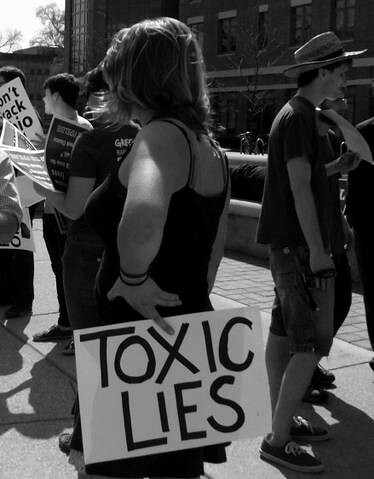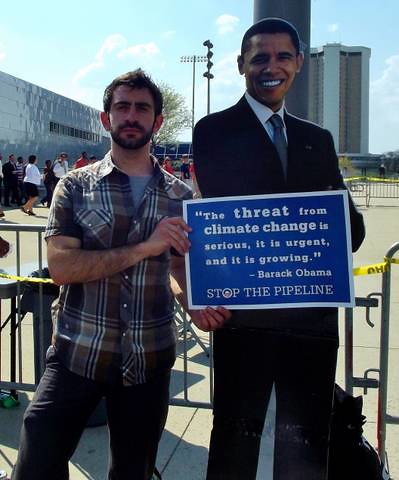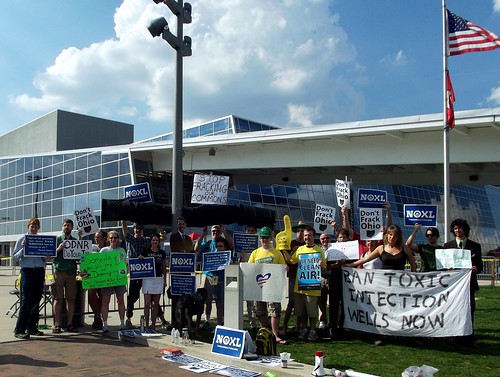 (Photo by Bill Baker)
A couple of hours before President Obama spoke at the Ohio State University on March 22, about 25 demonstrators against the Keystone XL pipeline project gathered on the sidewalk along High Street in front of the Ohio Union.
(Photo by Bill Baker)
A couple of hours before President Obama spoke at the Ohio State University on March 22, about 25 demonstrators against the Keystone XL pipeline project gathered on the sidewalk along High Street in front of the Ohio Union.
A day earlier, Obama announced in Cushing, Oklahoma his decision to fast-track the leg of the pipeline that will run from Oklahoma to Texas. Critics, many of them on the political right, say the president should approve the entire XL project, while environmentalists say he’s backpedaling, and going against his '08 campaign promise to address Climate Change.
Cruz Bonlarron, who led the mic-check of Mary Jo Kilroy when she spoke at Occupy the Courts on Jan 20, said there wouldn't be one this time for Obama. He said there weren’t enough protesters with tickets to get into OSU’s Recreation and Physical Activity Center (RPAC) where the president was scheduled to speak in a couple of hours.
But the protesters focused on communicating their message to High Street onlookers and passersby. People in autos honked and some cyclists in the 80 degree March heat waved and shouted in support of the protesters on the sidewalk, though one person in a car said, “I’m for fracking.”
Several protesters had copies of the same sign. Quoting Obama, it read, “let’s be the generation that finally frees America from the tyranny of oil.” He made the remarks on Feb 10, 2007, the day he announced his run for president, according to the following source
Danny Berchenko of 350.org Ohio told fellow protesters thru a bullhorn 2012 already has broken records
“As we have record-breaking heat, it’s ironic that Obama is coming to Columbus to talk about more drilling for oil and gas,” Berchenko said.
 (Photo by Bill Baker)
(Photo by Bill Baker)
Berchenko, who leads 350.ORG actions in Ohio, read an email sent to him by activist and author Bill McKibben, founder of the environmental organization.
“ ‘ On his visits, why isn’t Obama going to solar installations and supporting alternatives to fossil fuels?’” McKibben also asked in his email why Obama is fast-tracking approval for the southern leg of Key Stone XL as the main focus of his energy plan.
Berchenko told fellow activists to seize the opportunity to make Climate issues more prominent in our nation’s public discourse as Ohio is likely to get a lot of attention during the upcoming general election.
“We got to keep coming out to these events and bring more people to them. So then, as more people become concerned about what’s happening to our climate, they know where to go to get involved.”
It’s spring break. So when demonstrators marched from the Ohio Union to the $140 million recreation and fitness complex, there were, along the way, only a few laptop junkies under trees and a scattering of sunbathers whose bodies looked like beige islands in the green Oval sea.
As the protesters against XL marched and chanted, I trailed behind a couple or maybe a few hundred meters, coasting on my bike. One of two guys dancing a sort of bare foot and shirtless Frisbee ballet answered when I asked him if he knew what the march was about, “It’s something about a pipeline in Ohio, but what they were saying wasn’t really that clear.”
A little farther along on the Oval, a person playing catch with a baseball said, “I think they’re protesting about Obama. He’s here giving a speech. They were saying something about hydro-fracking and the oil pipeline.”
A young woman with him, focusing on the orange and red baseball and not looking at me said, “I don’t know.” Then, seamlessly, said to the guy, “Let’s go to Jeni’s after this. Maybe they got some new flavors.”
After the march went past the OSU main library and down a walkway westward toward the fitness and rec center where Obama would be speaking within an hour and a half or so, Delbert Booker, an African-American, said he thought the protesters against Keystone XL were Tea Partiers or some other group that might be associated with Republicans.
In the wake of the marchers who chanted “Hey Obama, we don’t want no climate drama,” Booker said what he heard as he exited the library were the words ‘Obama’ and ‘drama’. He said he started an organization called America’s Choice For The Issues, but I haven't found it online yet.
Among the signs, a bull horned speech or two, and chants such as “Climate Change is a growing cancer; all-of-the-above is not the answer,” I daydreamed about having some sort of public engagement about this and other issues several times a week on street corners downtown, in the Short North, near college campuses, and in other parts of Columbus.
There'd be no lecturing, preaching, or even chanting. Instead, we’d listen. We'd ask and answer questions, and trust that people could read our signs. And there'd be music, maybe fiddlers or violinists on unicycles, instead of pianists on flatbeds.
Well, anyway, some of the other chants were “Oil and gas are no solution; we are sick of your pollution,” and "How many children must get cancer before we find a better answer?”
 (Photo by Bill Baker)
(Photo by Bill Baker)
As with the Keystone XL protest during Obama’s visit to Columbus in September of 2011, I could find no African-American among the ranks of the activists. Two guys with a big Ron Paul banner were European-American. And an older gentleman with a sign blaming Obama for the national debt and other problems was Asian.
One Black man had a sign, but he wasn’t a protester. The sign was a call for a ticket to get into the event: “Help, I want to see the president.”
Another Black man who looked to be in his 40’s and 50’s said, “What’s there to protest? He’s the president.” I told him protesters against Keystone XL are not necessarily hostile toward Obama; they just want him to lead our country to invest in alternatives to fossil fuels.
Pranav Jani, an OSU associate professor who works with International Socialists Organization (ISO) on campus, talked with him and his friend. Later I overheard the guy saying, “I’m here for the president. I don’t care about that environmental crap.”
To me, this maybe was an example of someone focusing on a single issue: the fact that the US has a non-White president.
This reminds me of how a young Black woman at the PACT town hall meeting on the Near East Side coldly stared me down for a good 4 or 5 minutes, apparently as she noticed me taking notes and giving looks of disproval as Chareta Tavares moderated proceedings.
I wonder whether the young woman glowered at me because she assumed I didn’t like Tavares because I’m threatened by a Black woman with power. I shouldn’t try to read minds, but maybe I ought to account for how race might affect my own and other people’s perspectives on a wide variety of issues.
Occupy and the grassroots aspects of the Tea Party movement might involve a healthful amount of skepticism and distrust toward those who have authority or power. But speaking for myself, maybe I subconsciously allow myself to express that skepticism and distrust more openly when the person with the authority and power is not a White male. See related thread
But I digress--hopefully usefully to someone somewhere. And I digressed a bit biking my way to meet up with the protesters against Keystone XL, when I met three people demonstrating in support of it.
All of them were wearing Energy Citizen t-shirts. One of them, Jonathan Petrea, asked me what the protesters against XL might be thinking. I told him they say people trying to make money at the expense of public health and the environment are pushing the project.
Petrea said, “There is nothing wrong with making money. Once you make that money, you invest it when the demand for alternative energy is there.” He said it’ll be there as early adopters come into the market. Petrea said XL will bring much needed jobs to US workers.
OK. But how much trust should we put into financial markets when it comes to our future well-being and the well-being of future generations ?
